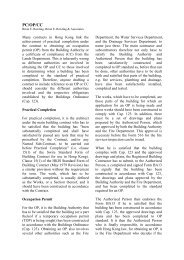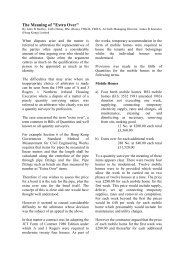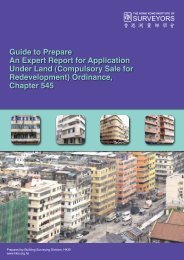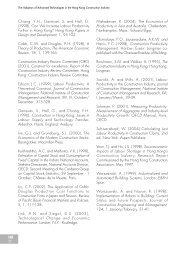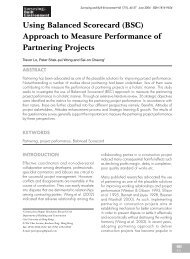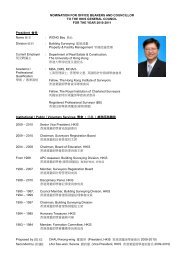Surveying & Built Environment Vol. 22 Issue 1 (December 2012)
Surveying & Built Environment Vol. 22 Issue 1 (December 2012)
Surveying & Built Environment Vol. 22 Issue 1 (December 2012)
You also want an ePaper? Increase the reach of your titles
YUMPU automatically turns print PDFs into web optimized ePapers that Google loves.
SBE<br />
42<br />
Good Property Valuation in Emerging Real Estate Markets? Evidence from Ghana<br />
have limited amount of information<br />
about property transactions in Ghana.<br />
One reason is that the land registries are<br />
few, compared with the population of<br />
the country (about 25 million people).<br />
Also locating the registries in only<br />
regional capitals, although there are<br />
over 350 urban areas in Ghana (Owusu,<br />
2005) creates problems of accessibility<br />
for the majority of the urban population.<br />
The Chief Registrar of Land has noted<br />
several other reasons. The fees are<br />
deemed too expensive by most people,<br />
especially when they have to pay<br />
registration fees in addition to stamp<br />
duty. Also, the institutional capacity of<br />
the supporting land sector agencies is<br />
weak. Hence, the preparation of basic<br />
cadastral plans can take as long as 12<br />
months. Also a majority of people do<br />
not understand the need for so much<br />
paper work (Sittie, 2006). Further,<br />
there is some evidence (Aryeetey et<br />
al., 2007, pp. 50-51) that, contrary to<br />
claims by the Title Registry that it deals<br />
with cases in a fair and expeditious<br />
manner, there are delays, red tapeism<br />
and corruption plaguing the registry.<br />
Finally, even when information in the<br />
land registry is available to valuers,<br />
questions of how recent the data are<br />
may arise, as in how to use information<br />
registered in 1986, 1996, or even 2006<br />
for a valuation in 2011.<br />
In principle, the problem of lack of<br />
data may be ameliorated by using<br />
information from the processes of<br />
compulsory acquisition of landed<br />
property. In Ghana, the state often<br />
acquires the allodial interest through<br />
compulsory acquisition under the<br />
State Lands Act 1962 (Act 125),<br />
Administration of Lands Act 1962<br />
(Act 123), Statutory Way Leaves Act<br />
1963 (Act 182), or the current (1992)<br />
Constitution (Abdulai, 2010). Between<br />
1850 and 2004, the state executed<br />
1,336 instruments to compulsorily<br />
acquire land. It did so in all the ten<br />
regions of Ghana. The regions with<br />
the greatest share of compulsorily<br />
acquired lands were Greater Accra<br />
(34.1 per cent), Western (26.7 per<br />
cent), Ashanti (13.3 per cent) and<br />
Brong Ahafo (10.1 per cent) (Larbi<br />
et al, 2004, pp.121-1<strong>22</strong>). According<br />
to article 271 of the Constitution of<br />
Ghana, fair and adequate compensation<br />
must be provided promptly for any<br />
land that is compulsorily acquired. The<br />
principle of land law as established in<br />
Nii Kpope Tsuru v Attorney General<br />
and Nii Amotia v Ghana Telecom<br />
is that the requirement to make the<br />
payment of compensation condition<br />
precedent for compulsory acquisition<br />
has no retrospective effect. In earlier<br />
constitutions, the state had to pay<br />
compensation but it could do so after<br />
acquiring the land.<br />
So, the requirement to pay<br />
compensation whether pre- or post<br />
compulsory acquisition has long been<br />
established in Ghanaian land law.<br />
Evidently, that opens up an avenue<br />
to obtain information for valuation<br />
purposes. In valuation parlance, the<br />
usual basis of compensation is the<br />
deprival value concept or the notion<br />
that compensation is equivalent to<br />
how much it would cost to reinstate<br />
expropriated persons to the condition<br />
in which they were prior to losing their<br />
land (Johnson et al., 2000). Assuming<br />
the subject land was useful for farming,<br />
estimating compensation on this basis<br />
requires accounting for crops lost as<br />
well as incidental costs such as the<br />
cost of relocation. Often, contestations<br />
of the adequacy and fairness of<br />
compensation in land courts lead to




